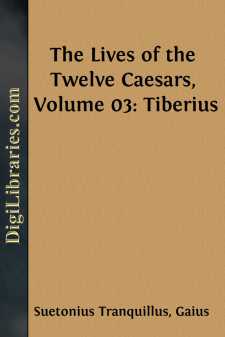Categories
- Antiques & Collectibles 13
- Architecture 36
- Art 48
- Bibles 22
- Biography & Autobiography 813
- Body, Mind & Spirit 142
- Business & Economics 28
- Children's Books 17
- Children's Fiction 14
- Computers 4
- Cooking 94
- Crafts & Hobbies 4
- Drama 346
- Education 46
- Family & Relationships 57
- Fiction 11829
- Games 19
- Gardening 17
- Health & Fitness 34
- History 1377
- House & Home 1
- Humor 147
- Juvenile Fiction 1873
- Juvenile Nonfiction 202
- Language Arts & Disciplines 88
- Law 16
- Literary Collections 686
- Literary Criticism 179
- Mathematics 13
- Medical 41
- Music 40
- Nature 179
- Non-Classifiable 1768
- Performing Arts 7
- Periodicals 1453
- Philosophy 64
- Photography 2
- Poetry 896
- Political Science 203
- Psychology 42
- Reference 154
- Religion 513
- Science 126
- Self-Help 84
- Social Science 81
- Sports & Recreation 34
- Study Aids 3
- Technology & Engineering 59
- Transportation 23
- Travel 463
- True Crime 29
The Lives of the Twelve Caesars, Volume 03: Tiberius
Description:
Excerpt
TIBERIUS NERO CAESAR.
(192)
I. The patrician family of the Claudii (for there was a plebeian family of the same name, no way inferior to the other either in power or dignity) came originally from Regilli, a town of the Sabines. They removed thence to Rome soon after the building of the city, with a great body of their dependants, under Titus Tatius, who reigned jointly with Romulus in the kingdom; or, perhaps, what is related upon better authority, under Atta Claudius, the head of the family, who was admitted by the senate into the patrician order six years after the expulsion of the Tarquins. They likewise received from the state, lands beyond the Anio for their followers, and a burying-place for themselves near the capitol [284]. After this period, in process of time, the family had the honour of twenty-eight consulships, five dictatorships, seven censorships, seven triumphs, and two ovations. Their descendants were distinguished by various praenomina and cognomina [285], but rejected by common consent the praenomen of (193) Lucius, when, of the two races who bore it, one individual had been convicted of robbery, and another of murder. Amongst other cognomina, they assumed that of Nero, which in the Sabine language signifies strong and valiant.
II. It appears from record, that many of the Claudii have performed signal services to the state, as well as committed acts of delinquency. To mention the most remarkable only, Appius Caecus dissuaded the senate from agreeing to an alliance with Pyrrhus, as prejudicial to the republic [286]. Claudius Candex first passed the straits of Sicily with a fleet, and drove the Carthaginians out of the island [287]. Claudius Nero cut off Hasdrubal with a vast army upon his arrival in Italy from Spain, before he could form a junction with his brother Hannibal [288]. On the other hand, Claudius Appius Regillanus, one of the Decemvirs, made a violent attempt to have a free virgin, of whom he was enamoured, adjudged a slave; which caused the people to secede a second time from the senate [289]. Claudius Drusus erected a statue of himself wearing a crown at Appii Forum [290], and endeavoured, by means of his dependants, to make himself master of Italy. Claudius Pulcher, when, off the coast of Sicily [291], the pullets used for taking augury would not eat, in contempt of the omen threw them overboard, as if they should drink at least, if they would not eat; and then engaging the enemy, was routed. After his defeat, when he (194) was ordered by the senate to name a dictator, making a sort of jest of the public disaster, he named Glycias, his apparitor.
The women of this family, likewise, exhibited characters equally opposed to each other. For both the Claudias belonged to it; she, who, when the ship freighted with things sacred to the Idaean Mother of the Gods [292], stuck fast in the shallows of the Tiber, got it off, by praying to the Goddess with a loud voice, "Follow me, if I am chaste;" and she also, who, contrary to the usual practice in the case of women, was brought to trial by the people for treason; because, when her litter was stopped by a great crowd in the streets, she openly exclaimed, "I wish my brother Pulcher was alive now, to lose another fleet, that Rome might be less thronged." Besides, it is well known, that all the Claudii, except Publius Claudius, who, to effect the banishment of Cicero, procured himself to be adopted by a plebeian [293], and one younger than himself, were always of the patrician party, as well as great sticklers for the honour and power of that order; and so violent and obstinate in their opposition to the plebeians, that not one of them, even in the case of a trial for life by the people, would ever condescend to put on mourning, according to custom, or make any supplication to them for favour; and some of them in their contests, have even proceeded to lay hands on the tribunes of the people....












